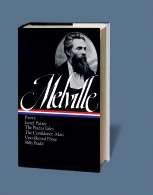Pierre, Israel Potter, The Piazza Tales, The Confidence-Man, Billy Budd, Uncollected Prose

Editorial Library Of America
Fecha de edición abril 1985
Idioma inglés
EAN 9780940450240
1478 páginas
Libro
encuadernado en tapa dura
Resumen del libro
Forgoing the narratives of the sea that prevailed in his earlier works, Melville's later fiction contains some of the finest and many of his keenest and bleakest observations of life, not on the high seas, but at home in America. With the publication of this Library of America volume, the third of three volumes, all Melville's fiction has now been restored to print for the first time.
Pierre; or, The Ambiguities, published in 1852 (the year after Moby-Dick), moves between the idyllic Berkshire countryside and the nightmare landscape of early New York City. Its hero, a young American patrician trying to redeem the secret sins of his father, elopes to the city, discovers Bohemian life, attempts a literary epic, and struggles his way through incest, murder, and madness. Long a controversial work, it is Melville's darkest satire of American life and letters and one of his most powerful books.
A pivotal work, both for Melville's career and for American literature, Pierre was followed by Israel Potter, the story of a veteran of the Revolution, victim of a thousand mischances, and a long-suffering exile in England. Along the way are memorable episodes of war and intrigue, with personal portraits of Benjamin Franklin, John Paul Jones, and George III. In the exploits of this touchingly optimistic soldier, Melville offers a scathing image of the collapse of revolutionary hopes.
The Piazza Tales demonstrates Melville's dazzling mastery of many styles, including The Encantadas, about nature's two faces enchanting and horrific; the famous Bartleby the Scrivener, about a Wall Street copyist who would prefer not to ; and the enigmatic Benito Cereno, about a credulous Yankee sea captain who stumbles into an intricately plotted mutiny aboard a disabled slave ship.
The Confidence-Man, Melville's last published novel, is in many ways a forerunner of modernist American fiction. An extended meditation on faith, hope, and charity as these are manifested on board a Mississippi riverboat one April Fools' Day, it presents a menagerie of Americans buying and selling, borrowing and lending, believing and mistrusting, as they are carried toward the auction blocks of New Orleans.
Many pieces never before collected are also included: the Authentic Anecdotes of Old Zack (burlesque sketches of Zachary Taylor's Mexican campaign), Fragments from a Writing-Desk (Melville's earliest surviving prose), reviews of Hawthorne, Parkman, and Cooper, and all the tales Melville published in magazines during the 1850s.
Finally, there is the posthumously published masterpiece Billy Budd, Sailor, the haunting story of a beautiful, innocent sailor who is pressed into naval service, slandered, provoked to murder, and sacrificed to military justice.
Biografía del autor
Herman Melville nació en Nueva York en 1819. Acuciado por la temprana muerte de su padre y la situación de su familia, desempeñó diversos oficios, entre ellos el de maestro y el de marinero a bordo de varios barcos por el Atlántico, el Pacífico y los mares del Sur. Finalmente se estableció en tierra firme en 1847. Acabó sus días en 1891 sumido en el olvido y en la precariedad económica.








